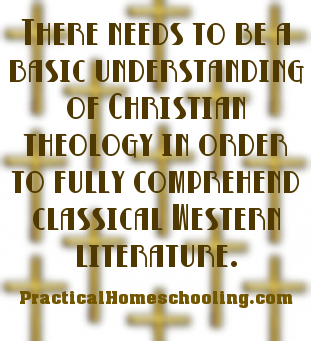 It is often said that the dominant theme of Western history is the momentous debate between paganism and Christianity. Even the reader who is not sympathetic to the Judeo-Christian tradition will be at great disadvantage when trying to make sense of Western history if he is not familiar with the central tenets of Christianity. Unless you have decided to remove all books from your library written between A.D. 50 and 1950, you simply cannot expect to make sense of Western literature without coming to term with its Christian influence.
It is often said that the dominant theme of Western history is the momentous debate between paganism and Christianity. Even the reader who is not sympathetic to the Judeo-Christian tradition will be at great disadvantage when trying to make sense of Western history if he is not familiar with the central tenets of Christianity. Unless you have decided to remove all books from your library written between A.D. 50 and 1950, you simply cannot expect to make sense of Western literature without coming to term with its Christian influence.
During my entire seminary education there were less than five books required for reading that were written before 1850. But the classical approach to Theology requires that we make use of the finest voices that have arisen in the church throughout its long history. Here are some book recommendations that will help you develop a classical approach to your study of Theology and the Bible.
Confessions, Augustine.
Augustine's Confessions is certainly the greatest Christian "testimony" every written. Not only is it one of the greatest works of theology that the church possesses, but it also is extremely readable. My mother has used the Confessions as a bedside devotional for many years and drawn great benefit from it. As Augustine describes God gently working upon his soul to bring him to faith, Augustine wonderfully shows the theological significance of seeming mundane everyday events. A memorable example can be found in his exposition of man's total depravity after recounting his childhood theft and malicious destruction of a neighbor's figs.
City of God, Augustine.
In A.D. 410 Rome fell to the barbarian Alaric. Rome's pagan establishment was quick to lay the blame for the city's fall on the recent rise of Christianity among the Roman populace. Between 413 and 426, Augustine wrote the City of God as an apologetic for the Christian faith against those who called Rome to return to its roots as a "pagan nation." Crucial to the development of our understanding of the relation of church and state, Augustine asserted that there are two realms, the "city of God" and the "city of man."
Proslogium, Anselm.
If you are interested in Christian apologetics, Anselm is a must. Open Court Press has published a nice edition that contains the core of this 11th-century scholastic's writings. His most famous proof, the ontological argument, has been debated for centuries and goes as follows: God is defined as that than which nothing greater can be conceived. If we then can conceive Him as anything but existing we do not conceive of God as defined, for then it would be possible to conceive of a God who did in fact exist and such a God would be greater than the God of whom we conceived.
Summa Theologiae, Thomas Aquinas.
The Summa Theologiae is the finest example of medieval scholastic theology. Aquinas covers an amazing range of theology and employs an argument/ counter-argument format that not only makes his writing very interesting, but also provides a delightful opportunity to see the arguments that his opponents had used against his own positions.
Divine Comedy and Paradise, Dante.
It is often said that in order to understand Dante you need to understand Aquinas, and in order to understand Aquinas you need to understand Aristotle. Reading Dante does require an impressive amount of background in the classical world; however, he provides the diligent reader with a instructive insight into what can go wrong with a syncretistic Christianity. Even though much of his vision of the afterlife can be dismissed as merely fantastical, a great deal of his theology results from confusing pagan philosophy and Christian theology. Dante is beautiful poetry, but often displays the muddled theology that plagued the church during the late Middle Ages.
Commentary on Galatians, Luther.
In contrast to the syncretistic world of The Divine Comedy, Luther and the reformers attempted to reassert a purely biblical Christianity. For help in this task, Luther returned to the writings of Augustine and his emphasis on man's total dependence on God's grace for his salvation.
Institutes on the Christian Religion, Calvin.
The Institutes give us one of the finest systematic expositions of the Christian faith. The Institutes not only had a profound influence on French prose, but they show a delicate understanding of the nature of man's knowledge as a fallen, sinful being who yet bears the image of God.
Like most subjects, without historical context, theology will quickly become a very dry subject, bearing little persuasive power as it gradually enslaves itself to the trendy fads that blow through contemporary theological circles. Ironically, going back to the past will help us tread more firmly toward the future.